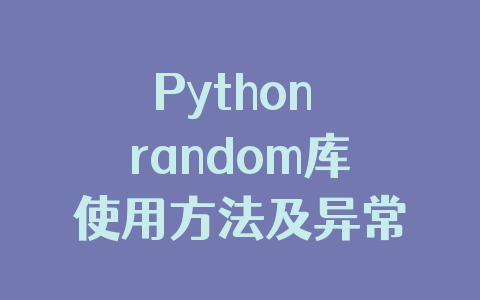在java 编程中,很多配置文件用键值对的方式存储在 properties 文件中,可以读取,修改。而且在java 中有 java.util.Properties 这个类,可以很方便的处理properties 文件, 在python 中虽然也有读取配置文件的类ConfigParser, 但如果习惯java 编程的人估计更喜欢下面这个用python 实现的读取 properties 文件的类:
\"\"\" A Python replacement for java.util.Properties class This is modelled as closely as possible to the Java original. \"\"\" import sys,os import re import time class IllegalArgumentException(Exception): def __init__(self, lineno, msg): self.lineno = lineno self.msg = msg def __str__(self): s=\'Exception at line number %d => %s\' % (self.lineno, self.msg) return s class Properties(object): \"\"\" A Python replacement for java.util.Properties \"\"\" def __init__(self, props=None): # Note: We don\'t take a default properties object # as argument yet # Dictionary of properties. self._props = {} # Dictionary of properties with \'pristine\' keys # This is used for dumping the properties to a file # using the \'store\' method self._origprops = {} # Dictionary mapping keys from property # dictionary to pristine dictionary self._keymap = {} self.othercharre = re.compile(r\'(?<!\\\\)(\\s*\\=)|(?<!\\\\)(\\s*\\:)\') self.othercharre2 = re.compile(r\'(\\s*\\=)|(\\s*\\:)\') self.bspacere = re.compile(r\'\\\\(?!\\s$)\') def __str__(self): s=\'{\' for key,value in self._props.items(): s = \'\'.join((s,key,\'=\',value,\', \')) s=\'\'.join((s[:-2],\'}\')) return s def __parse(self, lines): \"\"\" Parse a list of lines and create an internal property dictionary \"\"\" # Every line in the file must consist of either a comment # or a key-value pair. A key-value pair is a line consisting # of a key which is a combination of non-white space characters # The separator character between key-value pairs is a \'=\', # \':\' or a whitespace character not including the newline. # If the \'=\' or \':\' characters are found, in the line, even # keys containing whitespace chars are allowed. # A line with only a key according to the rules above is also # fine. In such case, the value is considered as the empty string. # In order to include characters \'=\' or \':\' in a key or value, # they have to be properly escaped using the backslash character. # Some examples of valid key-value pairs: # # key value # key=value # key:value # key value1,value2,value3 # key value1,value2,value3 \\ # value4, value5 # key # This key= this value # key = value1 value2 value3 # Any line that starts with a \'#\' is considerered a comment # and skipped. Also any trailing or preceding whitespaces # are removed from the key/value. # This is a line parser. It parses the # contents like by line. lineno=0 i = iter(lines) for line in i: lineno += 1 line = line.strip() # Skip null lines if not line: continue # Skip lines which are comments if line[0] == \'#\': continue # Some flags escaped=False # Position of first separation char sepidx = -1 # A flag for performing wspace re check flag = 0 # Check for valid space separation # First obtain the max index to which we # can search. m = self.othercharre.search(line) if m: first, last = m.span() start, end = 0, first flag = 1 wspacere = re.compile(r\'(?<![\\\\\\=\\:])(\\s)\') else: if self.othercharre2.search(line): # Check if either \'=\' or \':\' is present # in the line. If they are then it means # they are preceded by a backslash. # This means, we need to modify the # wspacere a bit, not to look for # : or = characters. wspacere = re.compile(r\'(?<![\\\\])(\\s)\') start, end = 0, len(line) m2 = wspacere.search(line, start, end) if m2: # print \'Space match=>\',line # Means we need to split by space. first, last = m2.span() sepidx = first elif m: # print \'Other match=>\',line # No matching wspace char found, need # to split by either \'=\' or \':\' first, last = m.span() sepidx = last - 1 # print line[sepidx] # If the last character is a backslash # it has to be preceded by a space in which # case the next line is read as part of the # same property while line[-1] == \'\\\\\': # Read next line nextline = i.next() nextline = nextline.strip() lineno += 1 # This line will become part of the value line = line[:-1] + nextline # Now split to key,value according to separation char if sepidx != -1: key, value = line[:sepidx], line[sepidx+1:] else: key,value = line,\'\' self.processPair(key, value) def processPair(self, key, value): \"\"\" Process a (key, value) pair \"\"\" oldkey = key oldvalue = value # Create key intelligently keyparts = self.bspacere.split(key) # print keyparts strippable = False lastpart = keyparts[-1] if lastpart.find(\'\\\\ \') != -1: keyparts[-1] = lastpart.replace(\'\\\\\',\'\') # If no backspace is found at the end, but empty # space is found, strip it elif lastpart and lastpart[-1] == \' \': strippable = True key = \'\'.join(keyparts) if strippable: key = key.strip() oldkey = oldkey.strip() oldvalue = self.unescape(oldvalue) value = self.unescape(value) self._props[key] = value.strip() # Check if an entry exists in pristine keys if self._keymap.has_key(key): oldkey = self._keymap.get(key) self._origprops[oldkey] = oldvalue.strip() else: self._origprops[oldkey] = oldvalue.strip() # Store entry in keymap self._keymap[key] = oldkey def escape(self, value): # Java escapes the \'=\' and \':\' in the value # string with backslashes in the store method. # So let us do the same. newvalue = value.replace(\':\',\'\\:\') newvalue = newvalue.replace(\'=\',\'\\=\') return newvalue def unescape(self, value): # Reverse of escape newvalue = value.replace(\'\\:\',\':\') newvalue = newvalue.replace(\'\\=\',\'=\') return newvalue def load(self, stream): \"\"\" Load properties from an open file stream \"\"\" # For the time being only accept file input streams if type(stream) is not file: raise TypeError,\'Argument should be a file object!\' # Check for the opened mode if stream.mode != \'r\': raise ValueError,\'Stream should be opened in read-only mode!\' try: lines = stream.readlines() self.__parse(lines) except IOError, e: raise def getProperty(self, key): \"\"\" Return a property for the given key \"\"\" return self._props.get(key,\'\') def setProperty(self, key, value): \"\"\" Set the property for the given key \"\"\" if type(key) is str and type(value) is str: self.processPair(key, value) else: raise TypeError,\'both key and value should be strings!\' def propertyNames(self): \"\"\" Return an iterator over all the keys of the property dictionary, i.e the names of the properties \"\"\" return self._props.keys() def list(self, out=sys.stdout): \"\"\" Prints a listing of the properties to the stream \'out\' which defaults to the standard output \"\"\" out.write(\'-- listing properties --\\n\') for key,value in self._props.items(): out.write(\'\'.join((key,\'=\',value,\'\\n\'))) def store(self, out, header=\"\"): \"\"\" Write the properties list to the stream \'out\' along with the optional \'header\' \"\"\" if out.mode[0] != \'w\': raise ValueError,\'Steam should be opened in write mode!\' try: out.write(\'\'.join((\'#\',header,\'\\n\'))) # Write timestamp tstamp = time.strftime(\'%a %b %d %H:%M:%S %Z %Y\', time.localtime()) out.write(\'\'.join((\'#\',tstamp,\'\\n\'))) # Write properties from the pristine dictionary for prop, val in self._origprops.items(): out.write(\'\'.join((prop,\'=\',self.escape(val),\'\\n\'))) out.close() except IOError, e: raise def getPropertyDict(self): return self._props def __getitem__(self, name): \"\"\" To support direct dictionary like access \"\"\" return self.getProperty(name) def __setitem__(self, name, value): \"\"\" To support direct dictionary like access \"\"\" self.setProperty(name, value) def __getattr__(self, name): \"\"\" For attributes not found in self, redirect to the properties dictionary \"\"\" try: return self.__dict__[name] except KeyError: if hasattr(self._props,name): return getattr(self._props, name) if __name__==\"__main__\": p = Properties() p.load(open(\'test2.properties\')) p.list() print p print p.items() print p[\'name3\'] p[\'name3\'] = \'changed = value\' print p[\'name3\'] p[\'new key\'] = \'new value\' p.store(open(\'test2.properties\',\'w\'))
当然,测试这个类你需要在程序目录下简历test2.properties 文件。才可以看到效果,基本可以达到用python 读写 properties 文件的效果.
补充知识:python修改配置文件某个字段
思路:要修改的文件filepath
将修改后的文件写入f2,删除filepath,将f2名字改为filepath,从而达到修改
修改的字段可以参数化,即下面出现的 lilei 可以参数化
imort os tag=“jdbc.cubedata.username=” midifyInfo=“jdbc.cubedata.username=lilei” f1=filepath f2=application.application fileInfo=open(filepath)
以上这篇在python中修改.properties文件的操作就是小编分享给大家的全部内容了,希望能给大家一个参考,也希望大家多多支持自学编程网。















